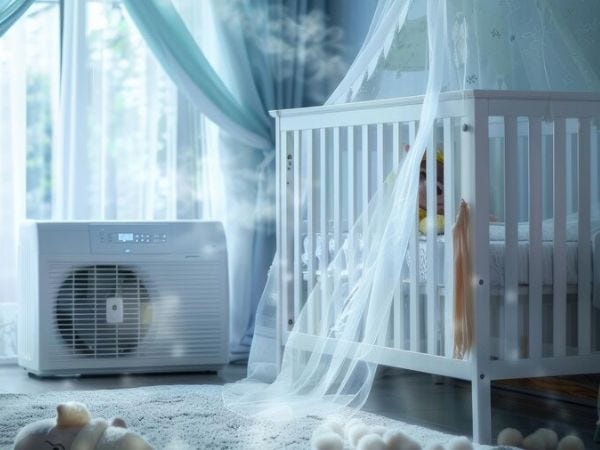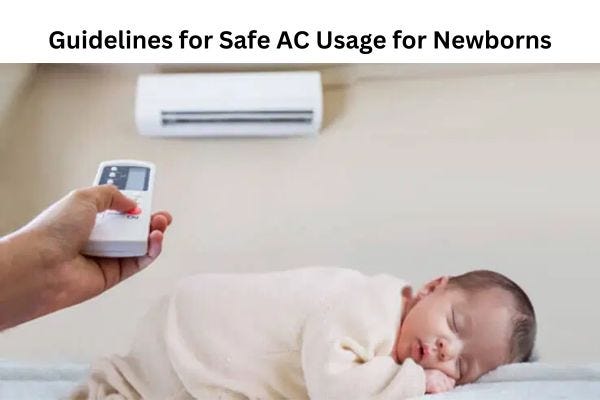Safe AC Usage for Newborns: Guidelines for Keeping Your Baby Cool Without Compromising Safety


Welcoming a newborn into your life brings immense joy. At the same time, you must ensure their comfort and safety, especially regarding room temperature. If you reside in a warm climate, you might be considering using an air conditioner for your baby's room.
For a peaceful night's sleep, experts suggest maintaining your baby's room temperature between 16-20 degrees Celsius with an air conditioner. While this may feel slightly cool for adults, it's proven to enhance sleep quality for infants. Start at 20°C and adjust if needed.
However, concerns about sleep quality and potential complications may arise. With that in mind, we will learn how to use an air conditioner for newborns. We will provide essential guidelines for keeping your baby cool and safe.
Importance of Maintaining a Comfortable Temperature for Newborns
Maintaining the right temperature for your newborn is vital for their health and safety. At first, it may seem like keeping them bundled up warmly is the best approach. But actually, it is not. You have to keep a balanced temperature in the air conditioner for newborns.
It is crucial to ensure your baby's environment isn't too hot or too cold. Overheating can increase the risk of Sudden Infant Death Syndrome (SIDS), particularly in the first six months of life. This means you have to keep your baby's surroundings at an optimal temperature to reduce this risk.
With that said, determining whether your baby is too hot or too cold can be tricky, especially for new parents. To gauge if your baby is too warm, check the nape of their neck for sweat. Although babies don't sweat like adults, moisture in this area could signal overheating.
On the other hand, recognizing when your baby is too cold is a bit easier. Watch for blueish hands and feet, which is normal for infants. However, excessive coldness could signal discomfort. If your baby's extremities feel chilly to the touch or if they're shivering, they may need to be warmed up.
Is Ac Good for Babies?
Many parents wonder if using an air conditioner for newborns is safe. No doubt, an AC can offer relief from the heat. At the same time, you must consider the side effects of AC on the baby's health and comfort.
Before we come to a conclusion on “fan or AC for baby,” you can evaluate the pros and cons of using AC for newborns.
Pros of Using AC for Babies
It is easier to maintain a comfortable temperature by using an air conditioner for newborns. Setting the right AC temperature for a 1-month-old baby will confirm they stay cozy and sleep well.
Quality air flow is vital for a baby's respiratory health. Often, AC units come with filters that can remove dust, allergens, and pollutants from the air. This promotes a healthier environment for your little one.
Cons of Using AC for Babies
Air conditioners can deplete moisture from the air. This may lead to dry skin and nasal passages for babies. To combat this, consider using a humidifier alongside the AC to maintain optimal humidity levels.
Babies have different temperature requirements than adults. While AC cools down the entire room, it may make the immediate vicinity around the crib cooler than necessary.
Some experts suggest that babies exposed to constant AC may become dependent on it for sleep. Hence, you must strike a balance and not over-rely on air conditioning. This will help your baby adapt to different temperature conditions.
Guidelines for Safe AC Usage for Newborns
Is air conditioning safe for newborns? Absolutely! Just like adults, babies thrive in a cool, comfortable environment. However, maintaining the right AC temperature and airflow for newborns requires some precautions.


Is air conditioning safe for newborns? Absolutely! Just like adults, babies thrive in a cool, comfortable environment. However, maintaining the right AC temperature and airflow for newborns requires some precautions.
Optimal Temperature Settings
The ideal temperature for newborns ranges between 72 and 78 degrees Fahrenheit. You must set the AC temperature for 1-month baby's room within this recommended range. Also, consider using an energy-saving mode on your AC. Therefore, you can regulate temperature fluctuations effectively.
Choose Reliable Equipment
You should think about investing in an air conditioner designed specifically for babies. An inverter AC, such as the Haier 1.5 ton inverter AC, can regulate the temperature more efficiently. Therefore, your baby will remain comfortable throughout the day and night.
Combat Dryness
Constant exposure to cool air can dry out your baby's sensitive skin. Combat dryness by moisturizing their skin regularly. Moreover, you can add a bowl of water to the room to maintain optimal humidity levels.
Dress Appropriately
Dress your baby in light clothing. The cloth must cover their arms and legs when in an air-conditioned room. This will regulate their body temperature and prevent them from getting too cold.
Positioning Matters
Avoid placing your baby directly in the path of air vents or near the AC unit. Direct exposure to cold air can lead to discomfort or chilling. This will affect your baby's delicate skin and health.
Regular Maintenance
Keep your AC unit clean and well-maintained, especially when your baby is in the room. Change air filters regularly and schedule professional maintenance. These are some good practices to prevent dust and contaminants from circulating in the air, which could be harmful to your baby's health.
Temperature Adjustment
Be mindful of outdoor temperature changes throughout the day and night. Adjust your AC settings accordingly to prevent your baby from getting too cold or too warm.
The House of Butterflys understands the importance of maintaining a comfortable temperature for newborns. They have a range of air conditioners for newborns. Most of them are designed to keep your baby cozy without compromising their safety.
Understanding the Risks of Using an Air Conditioner for Newborns
As a parent, keeping your newborn safe and comfortable is your top priority. You can create a cozy environment by regulating the AC temperature for a newborn baby. However, there are some potential risks associated with its use.
Let’s take a look at the possible risks of using an air conditioner for newborns.
Temperature Regulation
Babies, especially newborns, have difficulty regulating their body temperature compared to adults. This means they are more susceptible to overheating or getting too cold if the AC temperature for a 1-month baby isn't carefully monitored.
Risk of Overheating
Hot and humid environments can put your baby at risk of overheating. This can lead to dehydration, heat exhaustion, or even heatstroke. So, the air conditioner must provide proper cooling and ventilation. Although this can mitigate this risk, you should check the temperature is not too low.
Cold Exposure
Conversely, extremely cold temperatures from excessive AC usage can lead to hypothermia and frostbite in newborns. So, it is essential to find the right balance. Plus, you should avoid setting the AC temperature too low, especially during colder months.
Skin Sensitivity
Prolonged exposure to cool air from an air conditioner can dry out your baby's delicate skin. Thus, your baby may suffer from irritation or rashes. To minimize this risk, you should maintain proper humidity levels in the room and moisturize your baby's skin regularly.
Respiratory Concerns
Improperly maintained air conditioners may circulate dust, allergens, or other pollutants in the air. This type of situation increases the chances of exacerbating respiratory issues in newborns. So, regular AC maintenance is essential to ensure clean airflow. This includes filter cleaning and servicing.
Which Is Better for Using a Newborn Baby: an AC or a Cooler?
It depends on various factors when choosing between an air conditioner and a cooler for your newborn. Let’s find out whether you should go with a fan or AC for baby.
Should You Choose an Air Conditioner for Your Newborn?
ACs excel in hot weather and effectively control humidity levels. It allows you to maintain a comfortable environment for your baby. Plus, you have the flexibility to set the desired temperature according to your baby's needs.
Some AC models offer heating functions, which makes them versatile for year-round use. However, they can be costly to purchase, operate, and maintain, especially if you experience frequent power outages.
Should You Choose an Air Cooler for Your Newborn?
Coolers are budget-friendly alternatives to ACs. They can be more economical to run, particularly during power cuts. However, they may pose challenges in areas with water supply issues.
Coolers are less effective in humid weather. Plus, they require proper ventilation to maintain efficiency. Moreover, they can increase indoor humidity levels, potentially leading to discomfort and reduced cooling effectiveness over time.
So, Air Cooler or Air Conditioner for Your Newborn?
Ultimately, the choice between an AC and a cooler depends on your specific circumstances and preferences. Prioritize your baby's comfort and safety by selecting the option that best suits your needs. Also, you should apply the best hygiene practices for whichever cooling method you choose.
For optimal comfort, monitor indoor temperatures and humidity levels. This will help you decide if they fall within the recommended range for newborns. Additionally, use fans as a cost-effective cooling option when temperatures are moderate.
Perhaps the following chart will help you decide more effectively.
|
Air Conditioner |
Air Cooler |
|
|
Temperature Control |
Precise control of room temperature |
Limited control, relies on evaporation |
|
Efficiency |
Highly efficient cooling |
Less efficient, especially in humidity |
|
Cost |
Initial costs and running expenses are high |
Lower initial cost, cheaper to run |
|
Maintenance |
Regular filter cleaning required |
Requires periodic cleaning and water refilling |
|
Humidity Regulation |
Can control humidity levels |
Increases in humidity, may be beneficial in dry climates |
|
Comfort |
Provides consistent cooling |
Cooling effectiveness may vary |
|
Health Considerations |
May circulate allergens if not maintained properly |
May become a breeding ground for mosquitoes if not cleaned regularly |
|
Versatility |
Can be used year-round with a heating function |
Limited effectiveness in humid conditions |
|
Safety |
Some models emit harmful gases |
Less risk of harmful emissions, safer for prolonged use |
Bottom Line on Air Conditioner for Newborns
So, you should realize that it is achievable to maintain a safe and comfortable environment for your newborn with the use of an air conditioner. To recap, the ideal temperature for newborns ranges between 16-20 degrees Celsius.
Fortunately, most AC units do not drop below 16 degrees. It reduces the potential hazards and allows you to relax, knowing your baby is cool and safe. And if you are looking for the best air conditioner price in Bangladesh, you should visit the House of Butterfly. Plus, they offer top-notch after-sales services to maintain optimum airflow for newborns.

